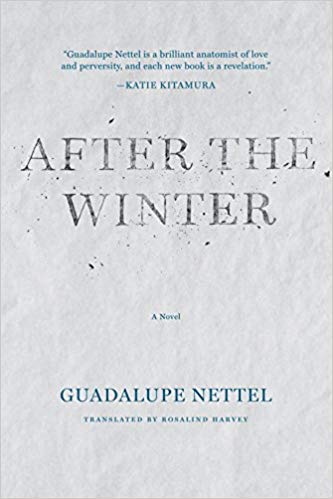After the Winter: A Novel by Guadalupe Nettel
Reviews
By Robert Rea
“A snow-covered volcano” is how Alfred Hitchcock once described the icy blonde look of leading lady Grace Kelly. Somewhere beneath the cool exterior and elegant charm beat the heart of a sly seductress. A similar layer of frost clings to Guadalupe Nettel’s achingly introspective novel. After the Winter tells the story of two lonely souls abroad and how a heart grown cold, after a while, warms up.
On the face of it, Nettel has written a novel about people who respond to crowded city life by turning inward. We meet two extreme introverts—Claudio in New York and Cecilia in Paris—both of whom erect barriers to protect themselves from strangers. One way they do this is to hunker down inside an apartment and dwell in solitude. Cecilia’s had a thing for graveyards since childhood and so, naturally, secures a perch across from Père-Lachaise. “By December, my life had been reduced to a ghostly state, reports of which reached no one,” she muses while gazing down on the cemetery where Oscar Wilde, Marcel Proust, and Jim Morrison rest. “I spent my time waiting for December 21, the date that marked the start of winter, real winter, the prelude to which was this lacerating cold that could already be felt. I spent hours staring out of the window, half listening to the news on the radio. Any other activity felt like far too much effort.”
Whereas Cecilia feels resigned to a life alone, Claudio positively delights in being antisocial. A prickly snob with zero self-awareness, he admits right off the bat, “I find living things threatening; you have to take care of them or they die. In short, they take up time and attention, and I am not prepared to give those away to anyone.” Claudio is a bona fide hater, and for some reason I find him endlessly entertaining, even as I find him endlessly frustrating. Cecilia at least has a scenic (though gloomy) view from the window of her apartment. The window in Claudio’s room, which he proudly compares to “a prison cell,” faces a dull, gray wall, and that suits him just fine. “I realize that in New York, my apartment has come to discharge the functions normally fulfilled by your family,” he plows on at length. “Protecting it from any intruders is my way of honoring my sanctuary and of turning it (I like the image immensely) into the mausoleum where I would like to be buried for all eternity.” A mausoleum, a cemetery—that about sums up these characters’ cold and distant attitude toward the people around them.
Nettel also tells a story about proximities and distances. Not only are Cecilia and Claudio emotionally distant from other people, they live far from their roots in Latin America. Being a goth kid in Oaxaca makes Cecilia an outcast, and while her fascination with French literature doesn’t win her any new friends, it gives her a chance to study in Paris. Claudio’s cranky ways stretch back to collective housing in socialist Cuba, “the stinking, pot-holed streets of Old Havana, the sticky heat I never quite managed to get used to.” If all this has little to do with the leftist revolutions and right-wing coups of the Boom generation, Nettel hews to tradition in other respects. No surprise that Cecilia whiles away the time visiting the graves of famous writers, among them César Vallejo and Julio Cortázar. Though Nettel now lives in Mexico City, she called Paris home for a spell. Her last book in translation—the autobiographical novel The Body Where I Was Born—split time between France and Mexico. She joins a long line of Latin wanderers, including Roberto Bolaño, to whom she pays tribute here with an epigraph.
In time, winter begins to fade, and underneath it all, this is simply a love story. Gradually, these two loners emerge from their chilly refuge from the world. Claudio has an on-again–off-again relationship with an older woman he casually refers to as “the old thing.” Cecilia’s neighbor Tom provides the “only source of heat” in her life with hot tea and home-cooked meals. Things take an erotic turn when Claudio plans a trip to Paris and, through a mutual friend, gets to know Cecilia. The parallel stories crisscross subtly and quietly before spinning out in unexpected ways. What elevates the book to the next level is the way Nettel, along with translator Rosalind Harvey, combines concision and clarity to talk about the most complex human feelings. After the Winter asks big questions about intimacy and desire, happiness and depression, passion and numbness, and, of course, love and loss. This may not be a masterpiece, but that may not matter. Nettel can hang with the best of the globetrotting bunch, and she more than proves it here.
Robert Rea is the deputy editor and web editor at SwR.
More Reviews

